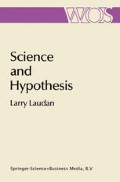Abstract
It is difficult to find a problem area in the philosophy of science about which more rubbish has been talked and in which more confusion reigns than ‘the philosophy of discovery’. It is even hard to keep the characters straight. Russ Hanson, who thought the logic of discovery was a good thing, advocated the method of abduction, which was a method for the evaluation, not the discovery, of hypotheses. Hans Reichenbach, who was notorious for insisting that the ‘context of discovery’ is of no philosophical significance, was a proponent of the straight rule of induction, a technique for the discovery of natural regularities if ever there was one. Not to be slighted here is Karl Popper who wrote a book called the Logic of Scientific Discovery, which denies the existence of any referent for its title.
Access this chapter
Tax calculation will be finalised at checkout
Purchases are for personal use only
Preview
Unable to display preview. Download preview PDF.
Notes
For a discussion of this problem, see my Progress and Its Problems (Berkeley, 1977), pp. 108–14.
See especially P. Duhem, To Save the Phenomena (Chicago, 1973 ).
The circumstances to which I refer are of two kinds: (a) if one believed that all the consequences of a theory could be examined, then consequentialism and infallibilism would be compatible; (b) if one believed that all possible theories could be enumerated and rejected seriatim by a method of exhaustion, then consequentialism and infallibilism are also compatible. For those many writers who rejected both of these assumptions, infallibilism ruled out any form of consequentialism.
For lengthy discussions of the views of these writers on the methodology of science, see Chapter 8 and 14.
J. F. W. Herschel, Preliminary Discourse on the Study of Natural Philosophy (London, 1830 ), p. 164.
W. Whewell, Philosophy of the Inductive Sciences,2nd ed. (London, 1847), vl. II, pp. 20–21.
W. Whewell, History of the Inductive Sciences,3rd ed. (London, 1857), vol. II, p. 370.
See especially Nickles’ introductory essay in T. Nickles (ed.), Scientific Discovery, Logic and Rationality (Dordrecht, 1980 ).
Author information
Authors and Affiliations
Rights and permissions
Copyright information
© 1981 Springer Science+Business Media Dordrecht
About this chapter
Cite this chapter
Laudan, L. (1981). Why was the Logic of Discovery Abandoned?. In: Science and Hypothesis. The University of Western Ontario Series in Philosophy of Science, vol 19. Springer, Dordrecht. https://doi.org/10.1007/978-94-015-7288-0_11
Download citation
DOI: https://doi.org/10.1007/978-94-015-7288-0_11
Publisher Name: Springer, Dordrecht
Print ISBN: 978-94-015-7290-3
Online ISBN: 978-94-015-7288-0
eBook Packages: Springer Book Archive

